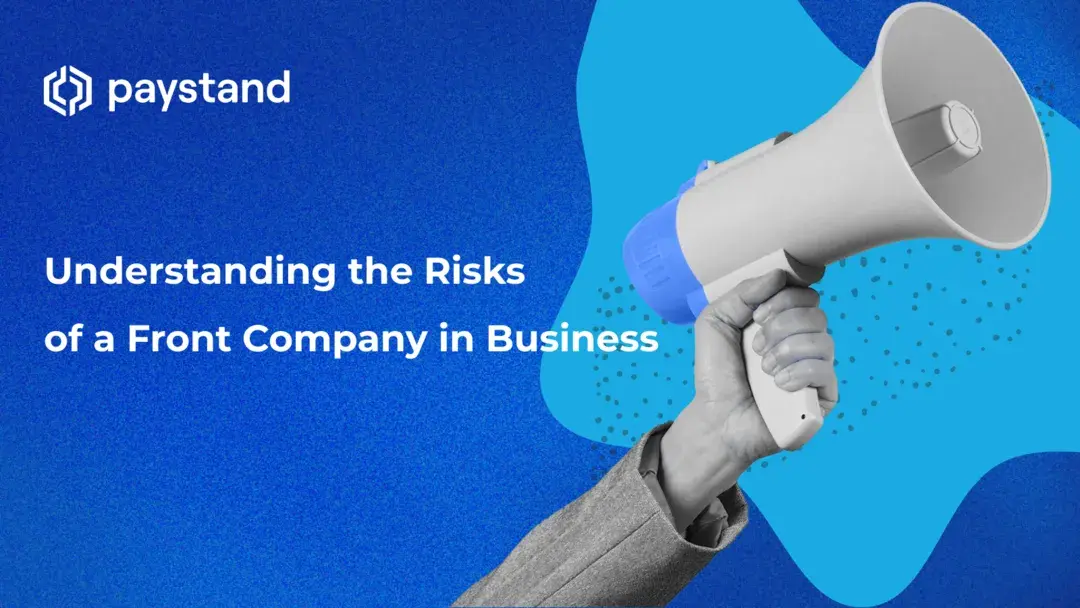Understanding the Risks of a Front Company in Business

Table of Contents
- What is a front company?
- Who sets up a front company?
- What is the difference between a shell company, a shelf company, and a front company?
- How to spot a front company?
Key Takeaways
- Front companies are fake businesses that hide illegal activities behind a legitimate façade.
- Criminal organizations, terrorists, and even some corporations use front companies for money laundering, drug trafficking, and influencing public opinion.
- Front companies differ from shell companies (inactive, asset-less businesses) and shelf companies (pre-registered, dormant entities).
- Suspicious payments, mismatched business activities, high-value fund transfers without a clear purpose, and multiple companies using the same address are red flags for spotting front companies.
- Awareness of front company tactics is essential for maintaining global security and economic stability and protecting individuals from fraud.
What if the businesses you see operating in broad daylight are not what they seem? Behind the façade of a seemingly legitimate company could lie a web of deceit, illegal operations, and criminal intent. This phenomenon isn't just a plot twist in a crime novel; it's a real-world tactic employed by criminals known as a front company.
Understanding the intricacies associated with front companies is basic for successful business financial management, as it can help you stay one step ahead of those who use deception as a business model. Keep reading to uncover the hidden world of front companies and learn how to protect yourself and your business from falling victim to their schemes.
What is a Front Company?
A front company or front organization is a fake company created by criminals or fraudsters to engage in fraudulent and illegal activities. It is fully operational, engaging in transactions and interactions, creating credibility that conceals its true motives. Products or services offered are a smokescreen to divert attention from its operations.
By operating under the guise of a legitimate business, criminals can operate without detection, even hiding the true identities of those involved, providing them with an added layer of anonymity.
Who Sets Up a Front Company?
Criminal organizations frequently create front organizations for money laundering and drug trafficking purposes. Front companies make it possible for these groups to launder their income from illegal activities like illegal gambling, extortion, smuggling, prostitution, and drug and sex trafficking. They also use these organizations to raise money, recruit more members, and spread propaganda.
Front companies are typically run by:
- Terrorist organizations
- Organized crime groups
- Secret societies
- Intelligence agencies
- Banned groups
- Political or religious organizations
- Illegal paramilitary groups
Some corporations set up front companies to advocate for them. Pharmaceutical companies have set up artificial patient groups that operate as front companies to pressure healthcare providers and legislators to adopt the pharmaceutical company’s products. Other large corporations have set up front companies to push the organization’s agenda or sway the public’s opinion.
Typical front companies include:
- Casinos
- Gambling houses
- Construction companies
- Hair and nail salons
- Restaurants, bars and clubs
- Engineering firms
- Trash-hauling services
- Dock-loading enterprises
What is the Difference Between a Shell Company, a Shelf Company, and a Front Company?
Although the term front company may sound like an umbrella term, different types of false organizations work as façades for illicit purposes, like shell or shelf companies. Here are the differences between them:
- Shell Company: Shell companies are inactive businesses with no significant assets. They are often used for illicit activities and legitimate purposes such as cross-border transactions or holding intangible assets.
- Shelf Company: A shelf company is a dormant registered company that still needs to complete the registration process and pay fees. It can be purchased to avoid the time and cost of forming a new company.
- Front Company: A front company is a physical entity conducting legitimate business while concealing illegal activities and the identities of those involved.
Understanding the differences between these is crucial for detecting fraudulent and illegal activities. This distinction helps identify illegal business practices.
How to Spot a Front Company?
Detecting red flags can help detect companies being used for illegal purposes. Among the signals that an organization can be a front company, we can find:
- Payments that do not have any particular purpose and show a contract or invoice number
- The company selling goods or services that do not match the industry the company operates in
- Multiple high-value funds transfers without a legitimate purpose related to the business
- Suspicious addresses and other address-related inconsistencies, such as two different transacting companies that use the same address
- Frequent activities from beneficiaries from high-risk, off-shore financial locations
- The inability to identify wire transfer senders or recipients
- A very large number of beneficiaries are receiving wire transfers from the same recipient
Front companies threaten global security and economic stability by facilitating various illegal activities. By posing as legitimate businesses, these organizations can launder money, fund illegal activities, and manipulate public opinion, all while maintaining a façade of credibility. As the lines between legitimate and illicit business practices blur, being vigilant and informed about their nature and tactics becomes increasingly vital.
The first step in combating the risks associated with front companies is awareness. By understanding what they are, who uses them, and the red flags to watch out for, they can be exposed and prevent potential harm. Whether you are a business owner, a financial professional, or an everyday consumer, staying informed about the tactics used by front companies will empower you to protect yourself and contribute to a safer, more transparent financial landscape.





